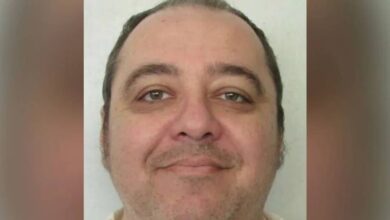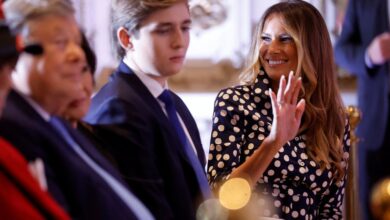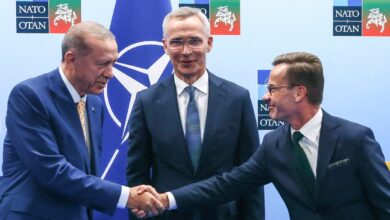How Mikhail Gorbachev saw his life’s legacy destroyed under Vladimir Putin

Vladimir Putin expressed his deepest condolences at the death of Mikhail Gorbachev. He will be sending a telegram, said his spokesman, to the former leader’s family and friends expressing his sympathy.
In reality, however, the latter years of Gorbachev’s life have been spent watching much of what he sought to achieve destroyed under Putin, culminating in a devastating war unfolding in the heart of Europe.
Hawks in the West have played their part in the demise of detente, and the descent back into the Cold War. But the embrace of aggressive nationalism by the current leader in the Kremlin has been the main driving force behind the current state of dangerous confrontation.
When Gorbachev left office as the last leader of the Soviet Union in 1991, Nato’s rapid response force in Europe numbered just 5,000. Following the Ukraine war and rising tensions across eastern Europe’s borders with Russia, this will increase to 300,000 by December 2023.
Threats of war ranging from boots on the ground, to weapons of mass destruction, were addressed at the time of Gorbachev with the Russian leader calling for nuclear disarmament at the Reykjavik summit with Ronald Reagan in 1986.
The last remaining nuclear arms control treaty between Washington and Moscow has been extended by five years after it was due to lapse last February. But Russia suspended visits by US inspectors, part of a mutual checking mechanism, three weeks ago. The Kremlin said this was in retaliation for US sanctions over Ukraine which stopped Russian nuclear officials from travelling to America. There appears to be no way around this impasse for the time being.
The US and Russia are now upgrading their missile systems. Putin, as he ordered his troops into Ukraine, warned the West that his country was a “potent” nuclear power and any attempt at interference would lead to “consequences you have never seen.”
He has since stated that “a nuclear war cannot be won and must never be fought”. But Kremlin cheerleaders have regularly appeared in the Russian media threatening the use of battlefield nuclear weapons and the destruction of cities in Europe and the US including London and New York.
On the ground in Ukraine, Russian bombardment in the area of the Zaporizhzhia nuclear plant, the largest in Europe, illustrates a highly risky modus operandi over a potential disaster. A mission by the International Atomic Energy Authority (IAEA) which was due to spend four days examining conditions at the facility has been reduced to one day by the Russian military.
Gorbachev, 91 and ailing, the son of a Ukrainian mother and a Russian father, had not publicly commented on the Ukraine war. His Gorbachev Foundation, a research institute that “seeks to promote democratic values,” issued a statement two days after the invasion calling for a “speedy cessation of hostilities.”
Gorbachev’s former interpreter Pavel Palazhchenko, who works for the foundation, said: “he always warned things could happen that could be very dangerous between Russia and Ukraine, but he always did what he could in order to bring these two nations closer together, rather than see a continuation of this rift that we now see widening. So for him, emotionally, it is very tragic.”
The internal reforms that Gorbachev brought about in Russia, personal and political freedoms, in media and academia, have also been largely reversed — and this allows the Kremlin to condemn criticism of foreign policy such as the Ukraine invasion as treachery.
Journalism has been targeted. Novaya Gazeta, the independent newspaper that Gorbachev helped to launch with his Nobel Peace Prize money, and is part-owned by the businessman Alexander Lebedev, ceased publication in March under the threat of new wartime censorship laws.
The radio station Echo of Moscow, which began in 1990, was also forced to close down as Russian troops went into Ukraine. One of its founding journalists, Aleksei Veneditkov, who was close to Gorbachev, said in an interview in July: “What Mikhail Sergeevich Gorbachev did is all destroyed, all his reforms have gone to zero, to ashes, to smoke….
“Freedom was Gorbachev’s business. He gave freedom to the church, freedom of speech, first law on press, on private property…”
Gorbachev, said Veneditkov, was distressed by the Ukraine invasion. “I can tell you that Gorbachev is upset, of course, he understands, it was his life’s work.”
Wrecking what Gorbachev sought to achieve has made Russia more vulnerable, Veneditkov held: “When they ask me ‘is there anything indicating that?’ I answer ‘…look at the threat level, there will be 300,000 Nato troops at our border by the end of next year.”
Putin has described the end of the Soviet Union as the “greatest geopolitical catastrophe of the century”. Millions of Russians, as he saw it, were left stranded in other countries, including Ukraine.
The betrayal, according to Putin on the eve of Ukraine invasion, was due to the weakness of past Russian leadership which failed to stand up to the West — a West which had sought to undermine Russia in Georgia, in Ukraine, and other former Warsaw Pact countries.





